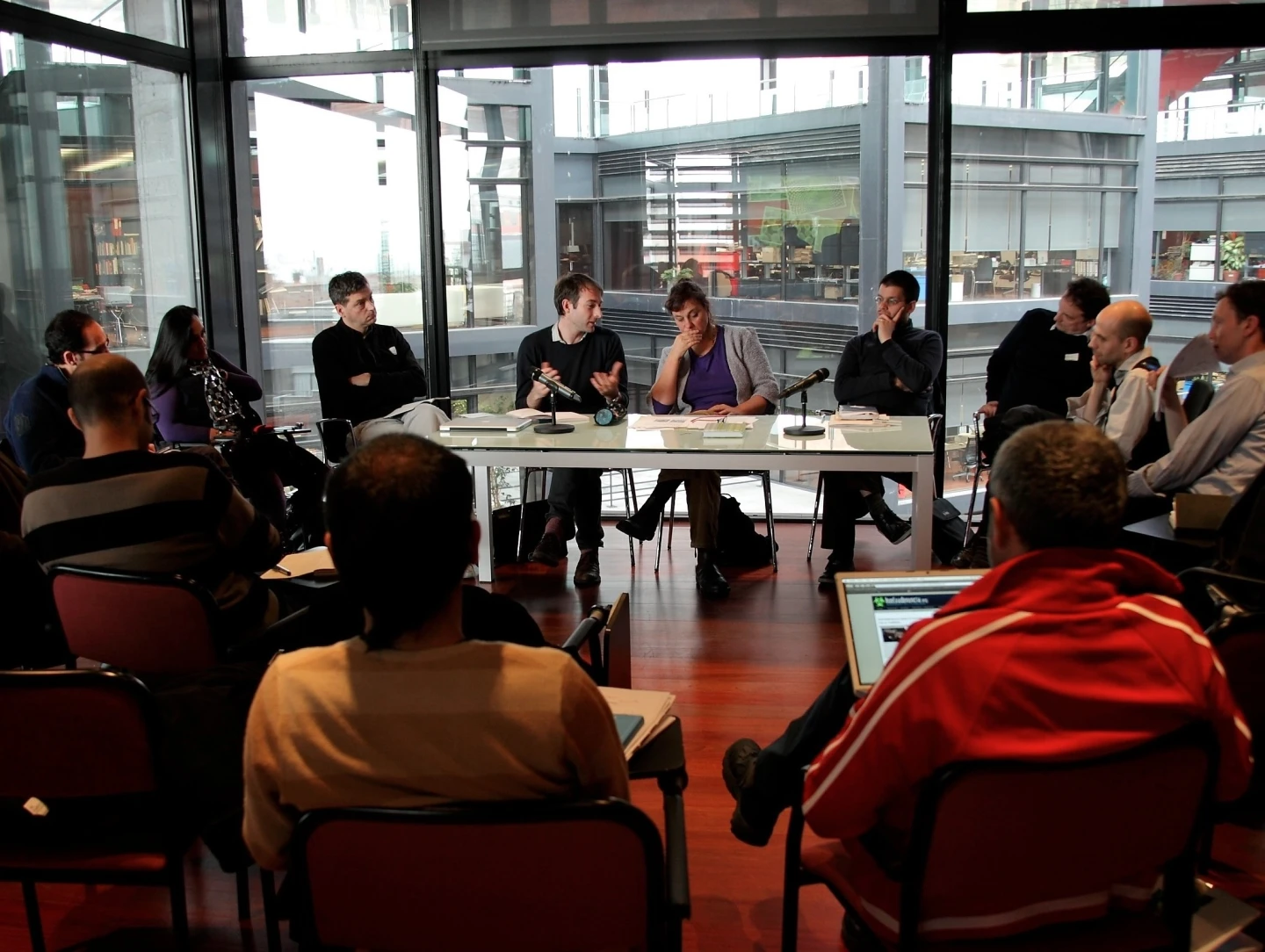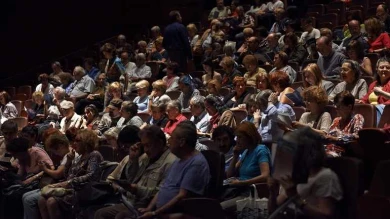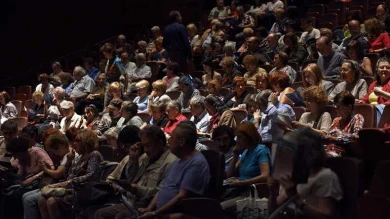-
February 18, 2014 Nouvel Building, Auditorium 200
Public lecture by Ticio Escobar
The contemporary museum: alternatives
A public activity within the 3rd Meeting of European and Latin American Museums, this lecture examines the crossroads that contemporary museums are currently facing. Motivated by the new notions of collection and art, but also aware of global interests, Ticio Escobar examines the potential and the danger of this new institution.
Modern times, and especially contemporary times, have led to a crisis in the traditional museum model. The basic function of this model is the custody of forms of heritage that express and sustain local imaginaries or that define certain historical stages or styles. Modernity complicated this model and as a result it was altered, the museum being entrusted with new tasks in the areas of research, documentation and archiving, and also a greater engagement in social and community development and a new degree of attention to citizen presence. But it also put the museum institution face to face with the complicated task of reconciling its new democratizing objectives with the potent interests of the art market.
The speed of the transnationalisation of culture has made these questions even more pressing. Now the museum not only must open up to the public space, it must open up to a public space that is largely globalised. This space is one that imposes different configurations of social imaginaries, most of which are based on mobile and provisional identities. Museum space has thus become crisscrossed by images of different cultures and moved by a plurality of intentions and purposes.
Finally, the collapse of the modern autonomy of art has led to the crisis of the museum closed behind a definitive notion of art. This promotes, in consequence, the contamination of museum spheres, which are forced to confront the blows of history and the infiltration of disciplines, problems and concepts that were previously unknown in the strict domains of art. This change of paradigm requires a new definition not only of the concept of museum but also of art itself, a task that began decades ago and entails the unexpected return of ontological perspectives that had been left behind. This lecture seeks to explore these questions and, with absolutely no intention of proposing models, to examine specific cases that constitute possible alternatives in the rethinking of museums.
Ticio Escobar (Asunción, 1947) is a researcher, curator, art critic and essayist. He is the author of the National Law on Culture of Paraguay. Founder and director until 2008 of the Indigenous Art Museum / Mud Museum, he is a former Secretary of Culture of the government of Paraguay. He has been the curator of the São Paulo Biennial and has also curated Paraguay’s representation at numerous other biennial events. He has published, among other studies, La belleza de los otros: arte indígena del Paraguay (1993), Sobre cultura y Mercosur (1995), El arte en los tiempos globales (1997), El arte fuera de sí (2004) and La invención de la distancia (2013).
-
February 19, 2014 ARCOmadrid
Panel 1: The public dimension of private collecting: challenges and problems
The growing weight of private capital and the simultaneous decapitalisation of state art institutions bring about challenges and various unknowns when establishing criteria of value and social dimensions that go further than those imposed by the market. This affects the entire system, including private and corporate collecting, which requires recognisable frameworks of reference and visibility. In addition, globalisation demands a harmonisation of the different ways of understanding the relationship between private and public in different cultural contexts.
Participants:
Patrick D. Flores, Curator of the Vargas Museum, Manila (Philippines)
Rafael García, Exhibition coordinator at Museo Reina Sofía, Madrid
Lola Hinojosa, Performing Arts and Intermedia curator at the Reina Sofía Museum, Madrid
Soledad Liaño, Exhibition coordinator at Museo Reina Sofía, Madrid
Natalia Majluf, Director, Lima Museum of Art - MALI (Peru)
Gabriel Pérez-Barreiro, Director of the Patricia Phelps de Cisneros Foundation (Caracas and NY)
José Roca, Estrellita B. Brodsky Adjunct Curator of Latin American Art, Tate Gallery (London)
Berta Sureda, Director of Public Activities at the Reina Sofía Museum, Madrid
Luis Augusto Teixeira, Collector (Rio de Janeiro)Moderated by:
João Fernandes, Deputy Art Director at the Reina Sofía Museum, Madrid
-
February 19, 2014 ARCOmadrid
Panel 2: Transformations in the concept of collecting. Towards a common heritage
The information society and the breakaway from old institutional structures have deeply transformed the notions of heritage based on the accumulation of objects, exclusivity and national identity. There is an urgent need to seek ways to meet the emotional demands and thirst for democratic participation of new societies, as well as methods to combat the displacement of the local that has been intensified by international economic flows.
Participants:
Zdenka Badovinac, Director of the Moderna Galerija de Ljubljana (Slovenia)
Pablo León de la Barra, Guggenheim UBS MAP Curator for Latin America
Cristina Cámara, Film and video curator at the Reina Sofía Museum, Madrid
Cosmin Costinas, Director of Para Site (Hong Kong)
Ticio Escobar, Curator, professor, art critic and cultural promoter (Paraguay)
Vasif Kortun, Director of research and programmes at SALT, Istanbul (Turkey)
Ana Longoni, CONICET researcher and professor at the University of Buenos Aires and PEI (MACBA). Promoter of the Southern Conceptualisms Network
Cuauhtémoc Medina, Chief curator of the MUAC (Mexico City)
Steven ten Thije, Research curator at the Van Abbemuseum (Eindhoven)Moderated by:
Jesús Carrillo, Head of Cultural Programmes at the Reina Sofía Museum, Madrid
-
February 20, 2014 ARCOmadrid. Forum Auditorium, Hall 9
Public discussions
The session is comprised of two public discussions between four participants, in which they will share the various issues discussed above in the tables.
Discussion Panel 1
12:30 p.m. - 01:30 p.m.
Discussion Panel 2
01:30 p.m. - 02:30 p.m.
3rd Meeting of European and Latin-American Museums

Held on 18, 19, 20 Feb 2014
The objective of this meeting is to analyse the changes in the relationship between private collections and museums, with the intention of proposing new models and possible alliances that promote the combination of ethical and artistic criteria in the configuration and functioning of collections. The concept of the collection has undergone a series of transformations that demonstrate the need to review terms like common heritage, memory and shared heritage within a framework of global collaboration between museums and private collecting.
Curatorship
Museo Reina Sofía
Organised by
ARCOmadrid 2014
Más actividades

Institutional Decentralisation
Thursday, 21 May 2026 – 5:30pm
This series is organised by equipoMotor, a group of teenagers, young people and older people who have participated in the Museo Reina Sofía’s previous community education projects, and is structured around four themed blocks that pivot on the monstrous.
This fourth and final session centres on films that take the museum away from its axis and make it gaze from the edges. Pieces that work with that which is normally left out: peripheral territories, unpolished aesthetics, clumsy gestures full of intent. Instead of possessing an institutional lustre, here they are rough, precarious and strange in appearance, legitimate forms of making and showing culture. The idea is to think about what happens when central authority is displaced, when the ugly and the uncomfortable are not hidden, when they are recognised as part of the commons. Film that does not seek to be to one’s liking, but to open space and allow other ways of seeing and inhabiting the museum to enter stage.
![Tracey Rose, The Black Sun Black Star and Moon [La luna estrella negro y negro sol], 2014.](https://recursos.museoreinasofia.es/styles/small_landscape/public/Obra/AD07091_2.jpg.webp)
On Black Study: Towards a Black Poethics of Contamination
Monday 27, Tuesday 28 and Wednesday 29 of April, 2026 – 16:00 h
The seminar On Black Study: Towards a Black Poethics of Contamination proposes Black Study as a critical and methodological practice that has emerged in and against racial capitalism, colonial modernity and institutional capture. Framed through what the invited researcher and practitioner Ishy Pryce-Parchment terms a Black poethics of contamination, the seminar considers what it might mean to think Blackness (and therefore Black Study) as contagious, diffuse and spreadable matter. To do so, it enacts a constellation of diasporic methodologies and black aesthetic practices that harbor “contamination” -ideas that travel through texts, geographies, bodies and histories- as a method and as a condition.
If Blackness enters Western modernity from the position of the Middle Passage and its afterlives, it also names a condition from which alternative modes of being, knowing and relating are continually forged. From within this errant boundarylessness, Black creative-intellectual practice unfolds as what might be called a history of touches: transmissions, residues and socialities that unsettle the fantasy of pure or self-contained knowledge.
Situated within Black radical aesthetics, Black feminist theory and diasporic poetics, the seminar traces a genealogy of Black Study not as an object of analysis but as methodological propositions that continue to shape contemporary aesthetic and political life. Against mastery as the horizon of study, the group shifts attention from what we know to how we know. It foregrounds creative Black methodological practices—fahima ife’s anindex (via Fred Moten), Katherine McKittrick’s expansive use of the footnote, citation as relational and loving labour, the aesthetics of Black miscellanea, and Christina Sharpe’s practices of annotation—as procedures that disorganise dominant regimes of knowledge. In this sense, Black Study is approached not as a discrete academic field but as a feel for knowing and knowledge: a constellation of insurgent practices—reading, gathering, listening, annotating, refusing, world-making—that operate both within and beyond the university.
The study sessions propose to experiment with form in order to embrace how ‘black people have always used interdisciplinary methodologies to explain, explore, and story the world.’ Through engagements with thinkers and practitioners such as Katherine McKittrick, C.L.R. James, Sylvia Wynter, Christina Sharpe, Fred Moten, Tina Campt, Hilton Als, John Akomfrah, fahima ife and Dionne Brand, we ask: What might it mean to study together, incompletely and without recourse to individuation? How might aesthetic practice function as a poethical intervention in the ongoing work of what Sylvia Wynter calls the practice of doing humanness?

Intergenerationality
Thursday, 9 April 2026 – 5:30pm
This series is organised by equipoMotor, a group of teenagers, young people and older people who have participated in the Museo Reina Sofía’s previous community education projects, and is structured around four themed blocks that pivot on the monstrous.
The third session gazes at film as a place from which to dismantle the idea of one sole history and one sole time. From a decolonial and queer perspective, it explores films which break the straight line of past-present-future, which mix memories, slow progress and leave space for rhythms which customarily make no room for official accounts. Here the images open cracks through which bodies, voices and affects appear, disrupting archive and questioning who narrates, and from where and for whom. The proposal is at once simple and ambitious: use film to imagine other modes of remembering, belonging and projecting futures we have not yet been able to live.

Remedios Zafra
Thursday March 19, 2026 - 19:00 h
The José Luis Brea Chair, dedicated to reflecting on the image and the epistemology of visuality in contemporary culture, opens its program with an inaugural lecture by essayist and thinker Remedios Zafra.
“That the contemporary antifeminist upsurge is constructed as an anti-intellectual drive is no coincidence; the two feed into one another. To advance a reactionary discourse that defends inequality, it is necessary to challenge gender studies and gender-equality policies, but also to devalue the very foundations of knowledge in which these have been most intensely developed over recent decades—while also undermining their institutional support: universities, art and research centers, and academic culture.
Feminism has been deeply linked to the affirmation of the most committed humanist thought. Periods of enlightenment and moments of transition toward more just social forms—sustained by education—have been when feminist demands have emerged most strongly. Awareness and achievements in equality increase when education plays a leading social role; thus, devaluing intellectual work also contributes to harming feminism, and vice versa, insofar as the bond between knowledge and feminism is not only conceptual and historical, but also intimate and political.
Today, antifeminism is used globally as the symbolic adhesive of far-right movements, in parallel with the devaluation of forms of knowledge emerging from the university and from science—mistreated by hoaxes and disinformation on social networks and through the spectacularization of life mediated by screens. These are consequences bound up with the primacy of a scopic value that for some time has been denigrating thought and positioning what is most seen as what is most valuable within the normalized mediation of technology. This inertia coexists with techno-libertarian proclamations that reactivate a patriarchy that uses the resentment of many men as a seductive and cohesive force to preserve and inflame privileges in the new world as techno-scenario.
This lecture will address this epochal context, delving into the synchronicity of these upsurges through an additional parallel between forms of patriarchal domination and techno-labor domination. A parallel in which feminism and intellectual work are both being harmed, while also sending signals that in both lie emancipatory responses to today’s reactionary turns and the neutralization of critique. This consonance would also speak to how the perverse patriarchal basis that turns women into sustainers of their own subordination finds its equivalent in the encouraged self-exploitation of cultural workers; in the legitimation of affective capital and symbolic capital as sufficient forms of payment; in the blurring of boundaries between life and work and in domestic isolation; or in the pressure to please and comply as an extended patriarchal form—today linked to the feigned enthusiasm of precarious workers, but also to technological adulation. In response to possible resistance and intellectual action, patriarchy has associated feminists with a future foretold as unhappy for them, equating “thought and consciousness” with unhappiness—where these have in fact been (and continue to be) levers of autonomy and emancipation.”
— Remedios Zafra

27th Contemporary Art Conservation Conference
Wednesday, 4, and Thursday, 5 March 2026
The 27th Contemporary Art Conservation Conference, organised by the Museo Reina Sofía’s Department of Conservation and Restoration, with the sponsorship of the Mapfre Foundation, is held on 4 and 5 March 2026. This international encounter sets out to share and debate experience and research, open new channels of study and reflect on conservation and the professional practice of restorers.
This edition will be held with in-person and online attendance formats, occurring simultaneously, via twenty-minute interventions followed by a five-minute Q&A.

